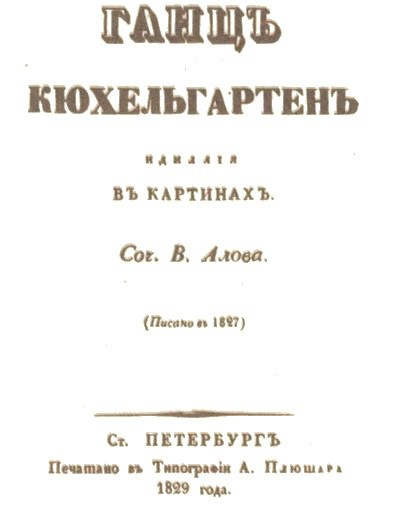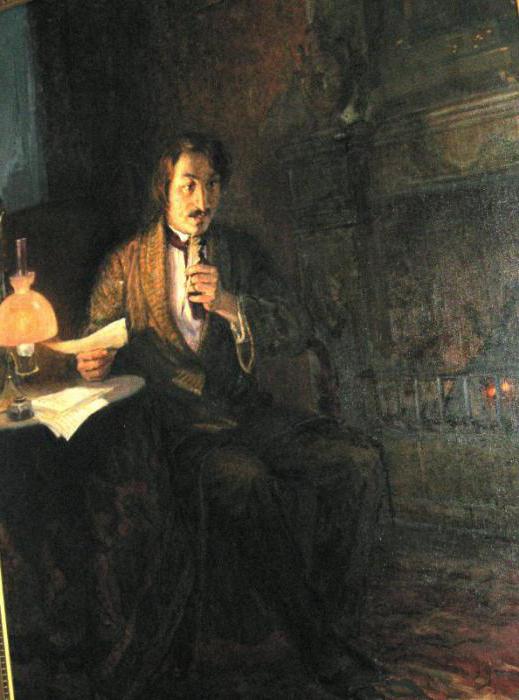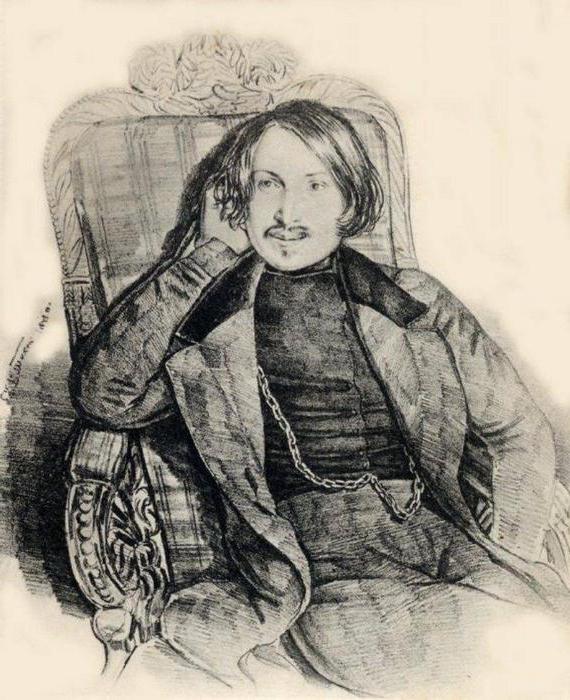Nikolai Vasilyevich Gogol is known to the overwhelming majority of the population as the author of Taras Bulba, Evenings on a Farm near Dikanka, Viya and so on. However, few people know that other, now almost forgotten works belong to him. One of them is Ganz Küchelgarten.
Brief curriculum vitae
Nikolai Gogol was born on March 20, 1809 in the village of Veliky Sorochintsy and was named after Saint Nicholas Dikansky - his mother believed that this would help the child survive (she gave birth many times, but the babies were born weak and quickly died). Since childhood, he painted well, in general, he did not shine in studies.
At nineteen, he moved to St. Petersburg, where at first he worked as an official, and then served in the theater. He did not like either one or the other, and he decided to try himself in literature. The first work, which brought success to the novice author, was the novel "Evening on the Eve of Ivan Kupala." In addition to writing stories and short stories, Gogol was engaged in drama - he still loved the theater very much and wanted to somehow be connected with it.
In the mid-thirties, the writer traveled a lot, it was abroad that he began work on the first volume of Dead Souls. Nikolay Gogol died on February 21, 1852.
The main works
Among the well-known works of Gogol, in addition to those already mentioned above, the following can be distinguished: "The Story of How Ivan Ivanovich Quarreled with Ivan Nikiforovich", "The Inspector General", "Marriage", "Overcoat", "Nose".
Among the works of Gogol, there is also a certain “Ganz Küchelgarten”. However, it is rather, on the contrary, little known - it is not studied either in schools or in institutes. What this story ("Ganz Küchelgarten") will be discussed above. It should be noted before that, strictly speaking, this work cannot be called a story; rather, it is a poem. Gogol himself designated it as "a romantic idyll in poetry."
Ganz Kuchelgarten: summary
As already understood from the above, this work is poetic. Gogol broke it into several paintings. In addition to Ganz Küchelgarten, there are several more heroes in it - his beloved Louise, with whom he has been friends since childhood, her parents, younger sister and grandparents, and grandfather, moreover, is a pastor, respected and respected man in a local village. It is the appearance of the pastor that this work opens. He is already old; sitting in a chair in the fresh air, he rejoices on a good warm morning, or slumbers.
The granddaughter Louisa, who came running up, seems anxious, she tells her grandfather that her “dear Ganz” hasn’t been his own lately, he is saddening something, he is worried about something. She is worried that he would not stop loving her and asks her grandfather to talk with the young man. When the next picture begins on behalf of Ganz, it becomes clear to the reader that he is keen on reading. He raves about Ancient Greece, its culture, its heroes. He is fascinated, it seems to him that there is “life”, and here he has - so, vegetation. The further plot of Ganz Küchelgarten is simple and obvious - Ganz leaves, leaving a note for Louise and breaking her heart. He goes to his dream.

Two years later, much has changed in the native village of Ganz - the old pastor, for example, is no longer alive, his desire to attend the granddaughter’s wedding did not come true. And the granddaughter herself, Louise, despite the elapsed time, is still waiting for her Ganz, no, no, yes, looking out the window. And he waits - Ganz returns home, tired and broken - he did not find what he expected in Athens. Illusions collapsed, he realized that true happiness was always with him.
History of creation
An interesting story is the creation of the poem "Ganz Küchelgarten" by Gogol. At first, by the way, it was not known that it belonged to Gogol’s pen - it became clear only after the death of a prose writer. Having written his “romantic idyll” at eighteen years old (and according to some sources, at nineteen or twenty; the poem’s compositions are acceptable years, therefore, 1827-1829), the young man took it to the publisher Adolf Plyushar, saying that this work was his friend, V. Alova. Under such a pseudonym (and, of course, on his own last money and even borrowed from friends), the poem was printed.
Gogol provided her with a small introduction, in which he indicated that this thing would never have been released if it were not for the circumstances “known only to the author”. The fact that the "Ganz Küchelgarten" belongs not to some Alov, but to Gogol himself, at that time only two knew - the servant of the youth Yakim and one of his friends, with whom he had just shared a shelter.
sources of inspiration
It is no secret that many authors, writing their works, draw inspiration from the events of their own destiny. Sometimes they talk about something that has already happened to them or their friends, sometimes, on the contrary, after composing some thing and identifying themselves with the hero, they strive to realize what is described in life. Something like this happened with Gogol.
After graduating from high school, Gogol went to Petersburg, which in his dreams seemed to him something majestic and sublime. He saw himself in this city in an aura of glory, with excellent work that brought him happiness, with success in the literary field. He dreamed of something he didn’t have, but what seemed so easily feasible - you just need to get into this city of dreams. That is exactly what the hero of the “Ganz Küchelgarten” reasoned - by the way, Gogol placed unimaginable hopes on this poem, believing that it would bring him both fame and honor.

In fact, everything turned out to be far from as rosy as imagined. The impression of Petersburg remained dull: the city is dirty, gray, and life is expensive, and even the theater does not have enough money, only for food. There were enough temptations, beckoning with bright signs and shop windows, but due to lack of money they were inaccessible, which could not but plunge Gogol into despair. He was not lucky with his career either - he did not find the desired place worthy of him.
In addition to life's turmoil, it is obvious that the source that inspired Gogol to create his poem was Foss's idyll “Louise” - he even borrowed the name of the main character from there. In addition to the name of the girl, Gogol took from this composition the image of a pastor and a description of rural life, which so closely resembles his pastoral. Nevertheless, one cannot speak of the exceptional influence of Voss's work on Gogol, if only because the former has traces of sentimental idyll, the latter has them too, but besides them, one can also notice the influence of romanticism that came from Zhukovsky and Byron, whom Gogol undoubtedly read. Researchers also highlight something from Pushkin and his poetics in Gogol’s poem - for example, Louise’s dream obviously reminds of Tatyana’s dream in Eugene Onegin. And there are many similar references in the content of “Ganz Kuchelgarten”.
Why does the poem depict Germany? This is explained simply. Gogol’s youth passed under the sign of the Germans - the novice writer passionately loved German literature and philosophy, was fond of the country and its inhabitants, and, as he himself later admitted in one of his letters, perhaps he simply mixed love of art with people, creating a kind of romantic ideal in his submission. German romantics excited Gogol’s mind, he tried to write, adjusting to them, and while still in high school, he gained some fame as a poet among his comrades.
Features of the poem
The main idea of the work, even clear from the summary of Gogol’s “Ganz Kuchelgarten”, is the danger of falling under the influence of his imagination, being completely in his power. In other words, in pink glasses. Gogol showed in his work (and he himself felt in life) what a similar situation could lead to.
Another feature of the poem is that the author himself called it an idyll, but at the same time destroys all the canons of this genre. The classical idyll portrays happiness in full measure, while Gogol's idyll is filled with elegy, in which the end is inevitable - far from happy. Subsequently, the destruction of the idyll will become one of the most popular topics in literature, so it can be considered that in the "Ganz Küchelgarten" Gogol took the first step towards this.
Also, a significant difference between the poem and the writer's subsequent works was that in it he described events that were not in reality, but that were supposed to happen (he himself planned a trip to the West), and later, in his future stories and short stories, Gogol wrote already, based solely on past life experiences and observations.
The image of the protagonist
It is already obvious that Gogol identified his Ghana with himself. The author put his ideas and dreams, his plans and hopes into the hero’s head - this is easy to trace if you read the letters of Gogol of this period, which he wrote to his mother and some friends.
A characteristic feature of the protagonist of “Ganz Kuchelgarten” is the desire to say goodbye to the hated philistine world, to express their abilities in something else. There is a hint of Decembrists - it is no coincidence that the name of Ganz is so similar to the name of the participant in the December uprising - Wilhelm Kuchelbecker, who was a poet and friend of Pushkin. Like the Decembrists, just like Gogol himself, Ganz Kuchelgarten is defeated in his attempts and thoughts - everything turns out to be completely different than he imagined. Life plays a cruel joke with him, but if
Wilhelm Küchelbecker and the rest of the Decembrists paid with their freedom, Ganz, like Gogol himself, only had to say goodbye to his illusions. However, in some ways this is the lack of freedom.
The name of the protagonist is also interesting - Ganz. In German, the word ganz means “all”, “whole” - the hero of the Gogolian work also wants to “embrace the immense”, to let the whole world into his life.
Reviews of contemporaries
Ganz Küchelgarten appeared in print in June 1829. The poem was available for sale exactly a month. During this time, nobody especially managed to buy it, but three critical reviews of the work came out. The opinions of reviewers about the poem were unflattering: one wrote that it would be better for the author not to publish this work, for which there are many reasons; another noted that there were enough “inconsistencies” in the idyll, the third - that it was immature and thoughtless. All these reviews came out almost simultaneously, one after another. Gogol carefully read each of them.
Gogol's reaction
First of all, it must be said that Gogol was very afraid of criticism. That is what prompted him to release his work under the pseudonym - they say, if they laugh, it’s not at him. Of course, he expected something completely different in his soul - he hoped for an instant sale of the entire circulation and an approving opinion in the press. The aspirations did not materialize, and after reading derogatory reviews, Gogol was so wounded that he immediately acquired all the “Ganz Küchelgarten” that he could get and burned every copy in his hotel room, specially made for this purpose. He was assisted by an old servant, Yakim. Only a few books could survive, thanks to which the poem was preserved.

In the same month, Gogol wrote to his mother about his failure, about the feeling of a complete catastrophe. There were also words that now “everything is alien to him in the world”. It was after this that he, suddenly and abruptly gathered, left for Germany - the country of his dreams. Probably, in order to check whether it really is such or even here failure awaits him. After the “Ganz Kuchelgarten," Gogol no longer wrote poetry, he did not reprint the poem itself, and until the end of his life did not tell anyone that V. Alov was him.
Interesting facts about Gogol
- In the early thirties he met with Alexander Pushkin.
- He made a pilgrimage to the holy places in Jerusalem.
- Never been married; made an offer, but he was refused.
- Afraid of a thunderstorm.
- He was very shy.
- He didn’t like his nose, considering it too long.
- He loved Italian cuisine.
- The writer's work subsequently had a great influence on Mikhail Bulgakov.
The Ganz Kuchelgarten and the subsequent literary activity of Nikolai Gogol is a good example of the fact that, even despite some setbacks, even falling, you must always rise and go to your goal. So Gogol acted - and did not lose.